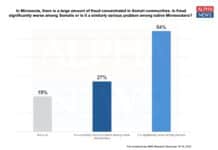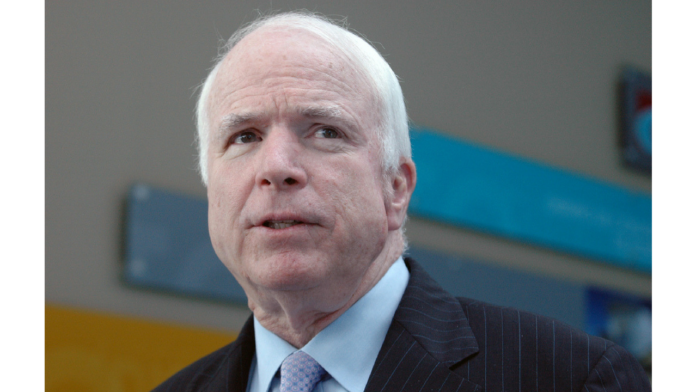Editor’s note: As John McCain is laid to rest, re-read this column by Jim Van Houten which was first published on July 21, 2018.
Military Hero
John McCain certainly meets Webster’s definition of a hero. There is no question that he chose over and over again to put himself at risk by doing things that most others would not during his five years as a North Vietnam prisoner of war. What were the drivers of that heroism?
Was it the responsibility of command? McCain was never the senior officer and he was often kept separated from other prisoners. However, he was the most famous prisoner held by the North Vietnamese and knew his behavior was being judged by the others.
Was it individual stubbornness? His record of disobedience to rules and insubordination before becoming a POW seems to have been habitual.
Was it his personal pride demanding he prove to others that he was more than a four-star admiral’s son, and deserved the recognition that he knew some others thought had just been special treatment?
McCain’s early career as a Naval Officer was certainly telling. His military record at Annapolis was poor. He graduated 894th in a class of 899. In his biography he admits, “I was really rebellious,” while a midshipman at the Naval Academy.
In a 2008 election year bio, the Los Angeles Times reported that he also had problems as a Naval Aviator. “His three crashes before deployment to Vietnam probably triggered a review to determine if he should be allowed to continue flying. Usually one at fault crash is enough to end flight status. Yet he was promoted ahead of others who seemed more qualified.”
It’s likely that Lieutenant Commander McCain’s North Vietnam prison guards were just the most recent of a twenty-year long-line of disciplinarians who tried and failed to control him, stretching from his time at the Naval Academy. “Saying no to his captors came more easily and naturally to John McCain,” according to Alvin Townley’s book, “Defiant,” the 2016 history of the most stubborn and die-hard American POWs during the Vietnam War. He refused to accept an early release when offered even though that meant more torture and hunger (losing 50 pounds during his captivity).
He was finally released in 1973 after the Paris Peace Accords. Then after a period of healing and retraining, the United States Navy provided McCain with three choice appointments. First he was sent to study at the national War College. Then, although he had never held a command and had not been in the fleet for five years, he was given command of a training squadron in Florida. And two years later was assigned as the US Navy Liaison Officer to the US Senate, and promoted to full captain. It was this final assignment that provided many of the contacts so valuable to him after retirement.
Captain McCain’s military awards included the Silver Star, two Legions of Merit (with Combat V), Distinguished Flying Cross, three Bronze Stars (with Combat V), two Purple Hearts, two Air Medals, two Navy and Marine Corps Commendation medals (with Combat V), and the Prisoner of War medal.
Political Leader
McCain retired from the Navy in 1981, and moved to Arizona. Already a local celebrity because of his military record, he ran for an open Arizona US House seat a year later, and won easily (65.9%); he was reelected in 1984 (78.1%); and won a US Senate seat four years later with 60.5% of the vote. He still holds that senate seat thirty-four years later.
In 2008, twenty-four years after becoming a senator, McCain was his party’s candidate for president. He lost to Barack Obama, the junior senator from Illinois. The outcome was a landslide. Obama received ten million more popular votes, and 365 of the 538 electoral votes. His campaign was criticized by many in his party, and McCain blamed much of the loss on his party’s selection of Sarah Palin as his running mate. McCain would try but would not again be selected his party’s candidate for president. With a safe seat at home he was now more independent than ever before.
The Go It Alone Republican
During the 2016 election, McCain’s aggressive criticism of Republican candidate Donald Trump resulted in Trump responding with the comment, “I like people that were not captured.” The comment was of course unfair and McCain never forgave Trump. And as chair of the powerful Senate Armed Services committee, and with his party needing every vote to hold its slim majority, he felt empowered to get even. Just four months after the 2016 election, the New York Times reported, “John McCain has become Trump’s critic in Chief.”
- McCain criticized Trump’s “America First” program to U.S. allies at the International Security Conference in Munich Germany.
- He didn’t vote for the Republican party’s priority campaign promise of a tax cut. The final vote of 51-48 was a near thing and almost failed.
- Then on July 28, 2017, he went through a dramatic show on the floor of the US Senate before casting a vote against his party’s second campaign priority, Obamacare repeal. A 50-50 vote would have allowed Vice President Pence to cast the tie-breaking vote. McCain’s “no” vote broke his party’s promise by 49-51. Democrats used this failure to claim that repeal of the ACA was a radical act rather than a popular campaign promise. The cooperating media repeated that claim.
- McCain blamed Trump’s talk of withdrawing U.S. forces from Syria for Assad’s decision to use chemical weapons on Syrian civilians.
- He publicly attacked Trump’s trade policies during the G-7 summit while the president was still attending.
- And last week McCain was one of the cheer-leaders for the criticism of president Trump’s meeting with Putin, calling the president’s actions “disgraceful.”
Looking ahead, most Americans will honor Senator McCain’s heroism and public service. This is absolutely appropriate.
Republicans will also honor him. But it seems they are also less likely to miss him.









